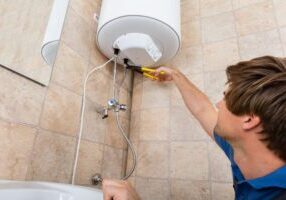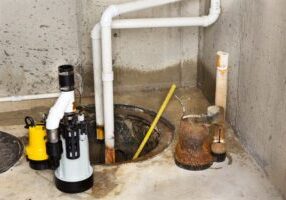Installing a sump pump is a key step in safeguarding your home from water damage. An experienced Oregon plumber can help you choose the right system to ensure optimal protection. Whether you’re dealing with a basement prone to flooding or simply want peace of mind, an Oregon plumbing contractor will make sure your sump pump works efficiently. Proper installation by trusted Oregon plumbing experts ensures that your home stays dry during heavy rains and potential water issues.
Water damage is one of the most costly and stressful problems homeowners face. Beyond the obvious financial implications, it can cause structural integrity issues, mold growth, and a host of other concerns. That’s where a sump pump comes in—a small but mighty device designed to protect your home from water intrusion.
Whether you’re dealing with basement flooding or groundwater seepage, installing a sump pump can be a game-changer. This guide will walk you through everything you need to know about installing a sump pump, how it prevents water damage, and why hiring professional plumbers in McMinnville, Oregon, might be your best bet.
Why Every Home Needs a Sump Pump
Understanding the Risks of Water Intrusion
Water intrusion can happen for a variety of reasons—heavy rainfall, melting snow, or even a high groundwater table. If water makes its way into your home’s basement or crawlspace, it can:
- Weaken your foundation
- Facilitate mold and mildew growth
- Damage valuable belongings stored in these spaces
How a Sump Pump Can Help
A sump pump is an electric-powered device that collects and pumps out water from your home, ensuring that your basement or crawlspace remains dry. The water is diverted to a safe distance away from your home, usually into a storm drain or dry well, reducing the risk of flooding and long-term damage.
If you’re unsure whether you need one, consulting with professional plumbers in McMinnville can provide insights tailored to your home’s specific needs and local weather conditions.
Key Components of a Sump Pump System
To better understand how sump pumps work, it’s useful to familiarize yourself with their key components:
1. Sump Pit
This is a specially designed pit or basin in your basement floor where water naturally collects. It’s the heart of the sump pump system and determines how effectively water is directed toward the pump.
2. Pump
Two common types of sump pumps are available:
- Submersible: Installed inside the sump pit, ideal for homes that require a cleaner, more concealed setup.
- Pedestal: Placed above the sump pit, these are easier to access and repair but take up more space.
3. Float Switch
This switch automatically activates the pump when the water level in the sump pit rises to a certain point.
4. Discharge Pipe
This pipe carries the pumped water outside and away from your home’s foundation.
5. Check Valve
A vital component that prevents water from flowing back into the sump pit.
How to Install a Sump Pump
Sump pump installation involves several steps. While this is a task that handy homeowners might take on themselves, partnering with professional plumbers in McMinnville, Oregon, ensures a flawless and worry-free installation.
Step 1: Assess the Installation Site
Choose a low point in your basement or crawlspace where water tends to collect naturally. Ensure the location has access to a power source and a nearby drainage area for the discharge pipe.
Step 2: Prepare the Sump Pit
Using a masonry drill or jackhammer, create a hole for the sump pit. The pit should be deep and wide enough to fit the basin as specified by your pump system. Once done, place the sump basin in the hole and backfill around it with gravel to keep it secure.
Step 3: Position the Pump
Whether you’re using a submersible or pedestal pump, position it inside (or above, for pedestal models) the basin. Make sure it fits securely and attach the float switch for automatic activation.
Step 4: Connect the Discharge Pipe
Connect the discharge pipe to the pump. Route the pipe through a hole drilled in the wall and point it away from your home’s foundation to direct water far enough to avoid drainage back into the basement.
Step 5: Install a Check Valve
Install the check valve on the discharge pipe to prevent water backflow. This step is especially critical to ensure optimal functionality and prevent overwork on the pump system.
Step 6: Test the System
Plug in the pump and pour water into the sump pit to test the float switch and pump operation. If water successfully moves through the discharge pipe and away from your home, your system is ready to go.
While DIY steps can be tempting, having experienced plumbers in McMinnville handle this task ensures precise connections and long-lasting performance.
Why Hire Professional Plumbers in McMinnville?
Hiring experienced Oregon plumbing contractors for sump pump installation ensures your home stays protected from water damage. A properly installed sump pump prevents flooding, safeguarding your foundation and basement. Experts at Top Notch Plumbing Oregon understand the unique challenges of plumbing in Oregon, offering reliable solutions tailored to your home’s needs. Professional installation not only enhances efficiency but also ensures long-term functionality. Don’t risk costly repairs due to improper setup—trust skilled plumbers to install your sump pump correctly, giving you peace of mind and reliable protection against unexpected water issues.
While some homeowners prefer the DIY route, there are many advantages to hiring professional plumbers for sump pump installation:
1. Expert Assessment
A professional plumber will evaluate your specific water drainage needs and recommend the most suitable sump pump type and capacity for your home.
2. Proper Sizing and Placement
Size matters with sump pumps. Professionals ensure that the pump and discharge pipe are appropriately sized for maximum efficiency.
3. Seamless Installation
Plumbers have the right tools and experience to install the system efficiently. They’ll address potential complications, such as tricky wiring or challenging discharge routes.
4. Warranty and Support
Professional installation often comes with warranties, offering you peace of mind and protection from unexpected repair costs.
If you’re in McMinnville, Oregon, reaching out to trusted local professionals ensures your home’s water protection needs are met with the utmost precision and reliability.
Maintenance Tips for Your Sump Pump
Once your sump pump is installed, regular maintenance can extend its life and keep it running effectively:
- Test Regularly: Pour water into the sump pit to ensure the pump activates and removes water properly.
- Inspect Components: Check the float switch, discharge pipes, and check valve for wear or blockages.
- Clean the Pit: Remove debris or sediment from the sump pit to keep it clean and functional.
- Check the Battery Backup: If your sump pump relies on a backup battery, ensure it’s charged and ready to activate during power outages.
Again, local experts like plumbers in McMinnville, Oregon, can assist with maintenance checks and any repairs you may need.
Take Action to Protect Your Home Today
Water damage isn’t just an inconvenience—it’s a costly problem that’s better prevented than repaired. Installing a sump pump ensures your home stays safe, dry, and structurally sound for years to come.
If you’re in McMinnville, Oregon, and need assistance with sump pump installation, reach out to experienced plumbers who can offer personalized solutions for your home. Give your house the protection it deserves and enjoy peace of mind, no matter the weather!
Get Expert Plumbing Help Today!
Are you ready to install a sump pump with expert assistance? Look no further than My Plumber Now—the top-notch plumbing service in Oregon! Our experienced plumbers in McMinnville, Oregon, are prepared to handle any plumbing issue with professionalism and care. Call us today at (503) 563-0989 or fill out our contact form to schedule an appointment. Let us provide you with the top-notch service you deserve, and restore your peace of mind!




